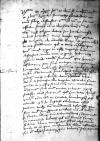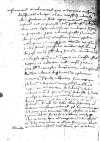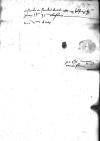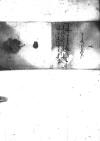Litteras Reverendissimae Dominationis Vestrae nuper ad me datas per Paulum eiusdem aulicum paenultima Maii accepi, agens gratias quam maximas de communicatione illarum et quia nihil in eis percalluerim, quod a meis consiliis, quae sacrae ⌊maiestati regiae⌋ in eisdem negotiis tribuerim, discrepat, cuncta rata et grata habui atque approbavi, orans eandem suam maiestatem, quo honorem consiliariorum pro sua antiqua et ingenuina benignitate adversus iniurias, quibus a domino ⌊Costka⌋ contaminati sunt domini consiliarii on the margin⌈domini consiliariidomini consiliarii on the margin⌉, aequam rationem habere superinscribed⌈haberehabere superinscribed⌉ et efflagitatam iuris administrationem eis administrare superinscribed in place of crossed-out habere⌈habere administrare administrare superinscribed in place of crossed-out habere⌉ velit. Nam si a principio illa tragoedia referenda foret, quanta in universis semel animis viva exacerbatio conciperetur, sua maiestas emetire valeret etc.
Patefeci etiam ⌊suae maiestati⌋, quod ⌊civitates Hansae⌋ generalem conventum in ⌊civitate Luneburgensi⌋ post octavam sancti Ioannis Baptistae celebraturi essent, praeterea mihi non inconveniens visum esse, quod sua maiestas per proprium nuntium, vel ad minus per scripta illas civitates visitaret, conquerendo de temeritate ⌊Lubicensium⌋, quod non sinerent suis subditis libera navigatione simul cum aliis mercatoribus uti, ex qua inaestimabili damno afficerentur sui cum aliis peteretque, quo Lubicenses pro aequitate paper damaged⌈[te]te paper damaged⌉  AAWO, AB, D. 8, f. 36v informantur et admonentur, quo a temere inchoatis desisterent, alioqui aliter vicissim adversus illos procedere et facto agere arderetur, quam ipsi cuperent etc. Et quoniam etiam percaluissem, quod ⌊Gdanenses⌋ illuc etiam destinabunt suos nuntios, et sumptibus, et impensis parcere voluerit, possit ⌊sua maiestas⌋ illa per Gdanenses commissione praevia expedire, attamen quia causa non esset parvi momenti, ut ista potius fierent per proprium nuntium, consului etc. De post misit
ill(ustris) or ill(ustrissimus)⌈ill(ustris)ill(ustris) or ill(ustrissimus)⌉
⌊dux Prussiae⌋ nuntium nobis et scripsit, quatenus maiestatem regiam in praemissum effectum rogare et adhortari vellem.
AAWO, AB, D. 8, f. 36v informantur et admonentur, quo a temere inchoatis desisterent, alioqui aliter vicissim adversus illos procedere et facto agere arderetur, quam ipsi cuperent etc. Et quoniam etiam percaluissem, quod ⌊Gdanenses⌋ illuc etiam destinabunt suos nuntios, et sumptibus, et impensis parcere voluerit, possit ⌊sua maiestas⌋ illa per Gdanenses commissione praevia expedire, attamen quia causa non esset parvi momenti, ut ista potius fierent per proprium nuntium, consului etc. De post misit
ill(ustris) or ill(ustrissimus)⌈ill(ustris)ill(ustris) or ill(ustrissimus)⌉
⌊dux Prussiae⌋ nuntium nobis et scripsit, quatenus maiestatem regiam in praemissum effectum rogare et adhortari vellem.
Misimus praeterea ⌊suae illustritati⌋ exemplum litterarum mearum ad ⌊regiam maiestatem⌋ datarum et ultra a duplicatione et replicatione quievimus, siquidem adhortatus fuit me written over ...⌈... illegible⌈...... illegible⌉ee written over ...⌉, quo scriberem, vellet etenim meas cum suis simul ad regiam maiestatem mittere.
De ⌊Lubicensibus⌋ indubie audivit Vestra Dominatio, quonam modo, data fide ⌊Hollandis⌋ et aliis in ⌊Dania⌋, eos navibus, bo<mb>ardis et aliis bonis ex(is)tima(tio)ne, ut fama fert, plus CCC milia marcarum spoliarunt, inde multi hoc bello illos superiores et victores evasuros autumant, quod Deus avertat, qui sed potius, quo temeritatem illorum compescat et retributionem debitam factis suis retribuat, orandus est written over se⌈sett written over se⌉.
Alia in novis, quae non incognita Reverendissimae Dominationi Vestrae esse putem, non habeo. Cuius amori et consueto favori me diligenter commendo on the margin⌈commendocommendo on the margin⌉ ac ut laetam et sanam vitam divina gratia opitulante  AAWO, AB, D. 8, f. 37r a saeculo in saeculum ducat opto.
AAWO, AB, D. 8, f. 37r a saeculo in saeculum ducat opto.
 AAWO, AB, D. 8, f. 36v informantur et admonentur, quo a temere inchoatis desisterent, alioqui aliter vicissim adversus illos procedere et facto agere arderetur, quam ipsi cuperent etc. Et quoniam etiam percaluissem, quod
AAWO, AB, D. 8, f. 36v informantur et admonentur, quo a temere inchoatis desisterent, alioqui aliter vicissim adversus illos procedere et facto agere arderetur, quam ipsi cuperent etc. Et quoniam etiam percaluissem, quod  AAWO, AB, D. 8, f. 37r a saeculo in saeculum ducat opto.
AAWO, AB, D. 8, f. 37r a saeculo in saeculum ducat opto.



